Metallic BSDF¶
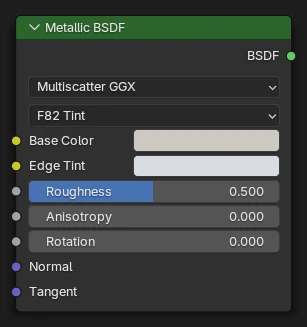
The Metallic BSDF node is used to recreate the appearance of metals.
Inputs¶
F82 Tint¶
- Base Color
Color of the material when viewed straight on.
- Edge Tint
Color of the material when viewed at a 82° angle.
Physical Conductor¶
- IOR
Refractive index per color channel. This is the real part of a complex refractive index, scientifically denoted as n.
- Extinction
Extinction coefficients per color channel. This is the imaginary part of a complex refractive index, scientifically denoted as k.
Common¶
- Roughness
Sharpness of the reflection; perfectly sharp at 0.0 and smoother with higher values.
- Anisotropy Cycles Only
Amount of anisotropy. Higher values give elongated highlights along the tangent direction; negative values give highlights shaped perpendicular to the tangent direction.
- Rotation Cycles Only
Rotates the direction of anisotropy, with 1.0 going full circle.
Compared to the Glossy BSDF node, the direction of highlight elongation is rotated by 90°. Add 0.25 to the value to correct.
- Normal
Normal used for shading; if nothing is connected the default shading normal is used.
- Tangent
Tangent used for shading; if nothing is connected the default shading tangent is used.
Properties¶
- Distribution
Microfacet distribution to use.
- GGX:
GGX microfacet distribution.
- Multiscatter GGX:
Takes multiple scattering events between microfacets into account. This gives more energy conserving results, which would otherwise be visible as excessive darkening.
- Beckmann:
Cycles Only Beckmann microfacet distribution.
- Fresnel Type
Models for describing the metal’s appearance, by specifying the apparent color or the physical IOR.
- F82 Tint:
Uses the Adobe F82-Tint formula for the metallic fresnel. This allows for artist friendly control of the color near the edge of the material to simulate a complex IOR.
- Physical Conductor:
Accepts Complex IOR measurements from real world metals to replicate a more accurate rendering of metals than the F82 Tint Fresnel type.
Complex IOR values can be found from sources like the Physically Based database for CG artists and Refractive Index nk database.
Outputs¶
- BSDF
Standard shader output.
Examples¶
F82 Tint¶
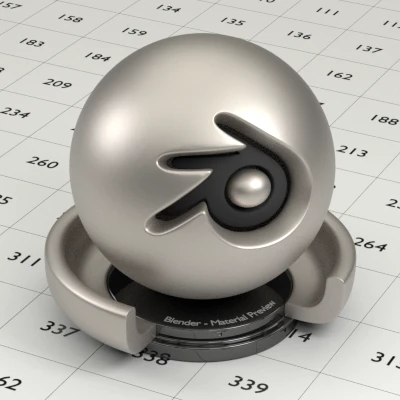
|

|
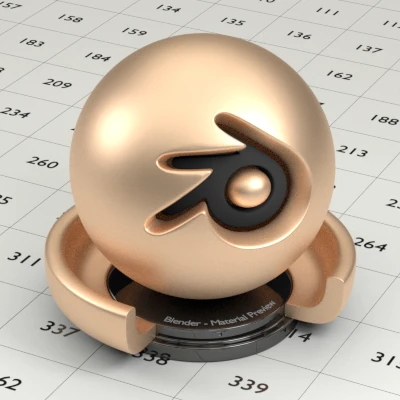
|

|
|
Material |
Titanium (Default) |
Aluminum |
Copper |
Gold |
Base Color |
0.617, 0.576, 0.540 |
0.911, 0.912, 0.917 |
0.972, 0.694, 0.486 |
1.000, 0.735, 0.353 |
Edge Tint |
0.695, 0.726, 0.770 |
0.848, 0.877, 0.916 |
0.961, 0.969, 0.942 |
0.993, 1.000, 1.000 |
Physical Conductor¶
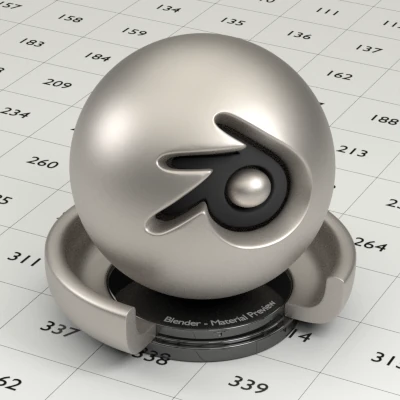
|

|
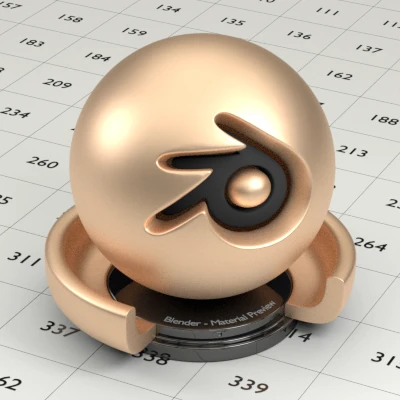
|

|
|
Material |
Titanium (Default) |
Aluminum |
Copper |
Gold |
IOR |
2.757, 2.512, 2.231 |
1.333, 0.945, 0.582 |
0.235, 0.729, 1.369 |
0.000, 0.470, 1.439 |
Extinction |
3.867, 3.404, 3.009 |
7.434, 6.340, 5.181 |
5.666, 2.562, 2.227 |
182.6, 2.189, 1.660 |